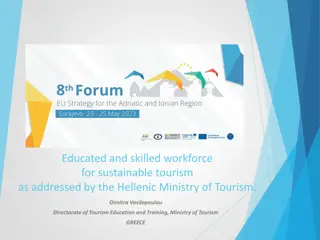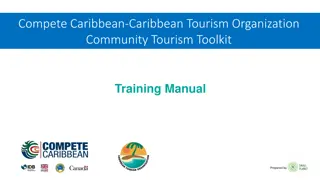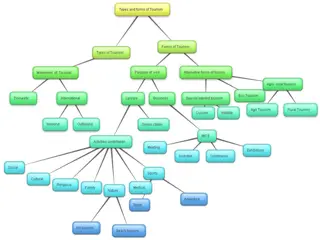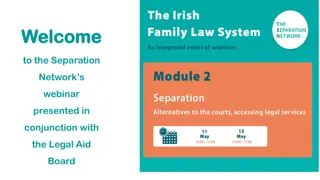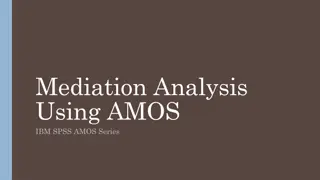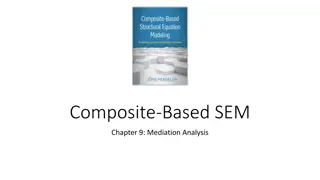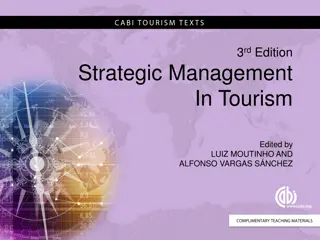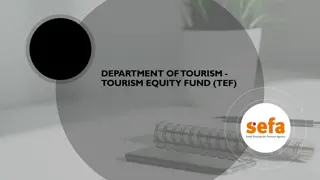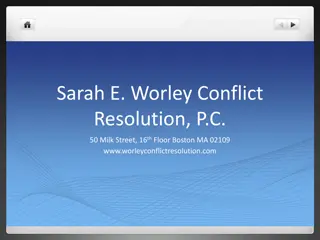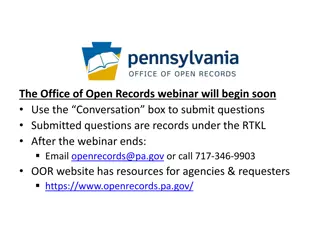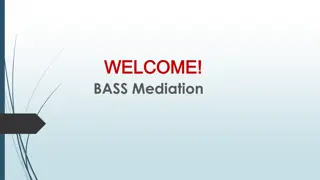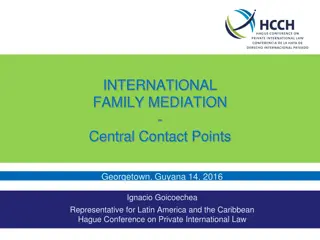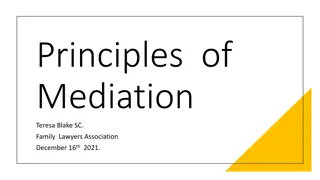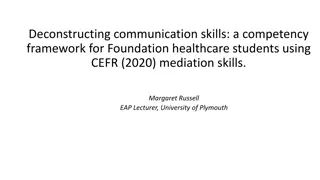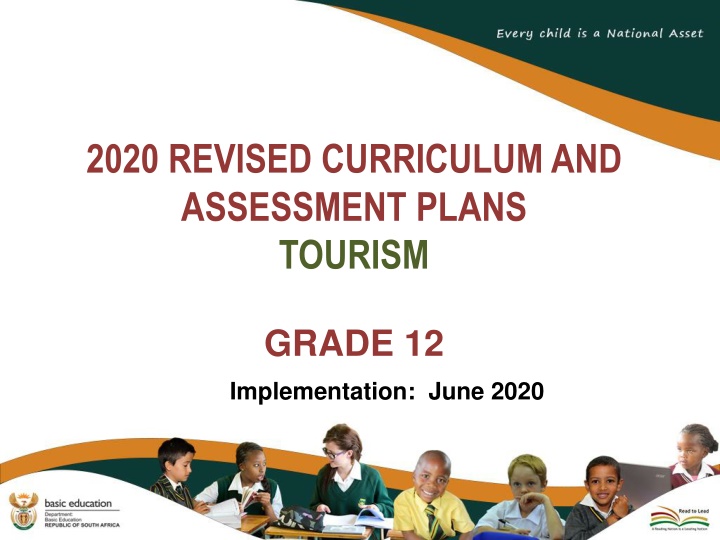
2020 Revised Curriculum and Assessment Plans for Grade 12 Tourism
Explore the amendments and implementation plans for the revised 2020 curriculum and assessment strategies for Grade 12 Tourism. Includes purpose, content overview adjustments, teaching plan modifications, and school-based assessment changes to assist in effective teaching and student preparation.
Download Presentation

Please find below an Image/Link to download the presentation.
The content on the website is provided AS IS for your information and personal use only. It may not be sold, licensed, or shared on other websites without obtaining consent from the author. If you encounter any issues during the download, it is possible that the publisher has removed the file from their server.
You are allowed to download the files provided on this website for personal or commercial use, subject to the condition that they are used lawfully. All files are the property of their respective owners.
The content on the website is provided AS IS for your information and personal use only. It may not be sold, licensed, or shared on other websites without obtaining consent from the author.
E N D
Presentation Transcript
2020 REVISED CURRICULUM AND ASSESSMENT PLANS TOURISM GRADE 12 Implementation: June 2020
Presentation Outline 1.Purpose 2.Amendments to the Content Overview for the Phase; 3.Amendments to the Annual Teaching Plan; 4.Amendments School Based Assessment (SBA) 5.Conclusion
1. Purpose To mediate the amendments of the trimmed and re-organised 2020 Annual Teaching Plan including School Based Assessment for Tourism , Grade 12 for implementation in June 2020 as stipulated in Circular S2 of 2020. To ensure that meaningful teaching proceeds during the remaining teaching time as per the revised school calendar. To assist teachers with guided pacing and sequencing of curriculum content and assessment.
1. Purpose (continued) To enable teachers to cover the essential core content /skills in each grade within the available time. To assist teachers with planning for the different forms of assessment. To ensure learners are adequately prepared for the subsequent year/s in terms of content, skills, knowledge, attitudes and values
2. Amendments to the Content Overview for the Phase
Summary: Amendments to the Content Overview for the Phase Grade 10 Grade 11 Grade 12 *Trimmed * Reorganised *No amendment Tourism Sectors Tourism Sectors Tourism Sectors Map Work and Tour Planning Map Work and Tour Planning Map Work and Tour Planning Location of the following on a colour map of the world. Distance indicators and distance tables.
Summary: Amendments to the Content Overview for the Phase Grade 10 Grade 11 Grade 12 *Trimmed * Reorganised *No amendment Tourism Attractions Tourism Attractions Main tourist attractions in the SADC countries: (*World Heritage Sites) attractions Botswana: Chobe National Park Democratic Republic of the Congo (DRC): Kahuzi-Biega National Park*, Salonga National Park * Lesotho: Maluti Mountains, Basotho pony trails, Madagascar: Tsingy de Bemaraha Strict Nature Reserve* Mauritius: Chamarel Falls and the coloured earths of Chamarel, Tamarin Bay Mozambique:Cahora Bassa Dam Namibia: Skeleton Coast Malawi: Liwonde National Park Swaziland:Royal Swazi Sun Hotel, Mkhaya Game Reserve Tanzania:Stone Town of Zanzibar*, Ngorongoro Conservation Area* Zambia: Livingstone, Kafue National Park Zimbabwe: Hwange National Park, Mana Tourism Attractions Only 3 provinces are studied Luxury private game reserves National botanical gardens SANParks
Summary: Amendments to the Content Overview for the Phase Grade 10 Grade 11 Grade 12 *Trimmed * Reorganised *No amendment Sustainable and Responsible Tourism Sustainable tourism: The need for sustainable practices in tourism businesses Responsible Tourism: The benefits of good environmental practices for the tourism industry Global warming and the tourism industry: Consequences of climate change on the tourism industry. How accommodation establishments can minimize their carbon footprint through green tourism practices How tourists can minimize their carbon footprint Sustainable and Responsible Tourism Term 3 Week 2: Move Term 3 Week 4 to Term 3 Week 2 Term 3 Week 3: Move Term 3 Week 5 to Term 3 Week 3
Summary: Amendments to the Content Overview for the Phase Grade 10 Grade 11 Grade 12 *Trimmed * Reorganised *No amendment Domestic, Regional and International Tourism Domestic, Regional and International Tourism Domestic, Regional and International Tourism Term 2 Week 7:Move Term 3 Week 1 to Term 2 Week 7. Term 2 Week 8:Move Term 3 Week 2 to Term 2 Week 8. Regional tourism: Role of the Regional Tourism Organisation of Southern Africa (Retosa)
Summary: Amendments to the Content Overview for the Phase Grade 10 Grade 11 Grade 12 *Trimmed * Reorganised *No amendment Culture and Heritage Tourism Elements of culture, such as architecture, interiors arts and crafts, cuisine, music and dance Heritage sites in South Africa Cultural heritage sites, such as monuments, museums, historical buildings, graveyards, paleontological objects Natural heritage sites, such as mountains, waterfalls, caves The difference between local, provincial and national heritage sites The heritage plaque which identifies sites declared national heritage sites Culture and Heritage Tourism Culture and Heritage Tourism Term 3 Week 4: Move Term 3 Week 6 to Term 3 Week 4
Summary: Amendments to the Content Overview for the Phase Grade 10 Grade 11 Grade 12 *Trimmed * Reorganised *No amendment Foreign Exchange Foreign exchange and its value to the South African economy Concept: informal fluctuations Foreign Exchange Term 2 Week 6: Combine Week 6 & 7 of Term 2 into one week. Communication and Customer Care Service excellence The advantages of excellent service delivery for a business for a tourist. The consequences of poor service delivery. Recommendations for improvement of poor service delivery. Communication and Customer Care Customer care for foreign tourists: Ways in which the tourism industry in South Africa will benefit from excellent customer care Global distribution systems: (The names and what they are used for) What is a Global Distribution System (GDS)? Examples of the major global GDSs, such as Amadeus, Galileo, Worldspan. Central reservation systems What is a Central Reservation System (CRS)? Examples used in South Africa: Micros-Fidelio Opera Communication and Customer Care Term 3 Week 5: Move Term 3 Week 7 to Term 3 Week 5
Summary: Amendments to the Content Overview for the Phase Grade 10 Grade 11 Grade 12 *Trimmed * Reorganised *No amendment Marketing Marketing Marketing Market research The process of market research: consider factors such as the potential customer, broader target market, competition, distribution of product, financing, marketing mix (the five Ps of marketing mix: Product, Promotion, Price, Place, People) Resources required for market research (budget for outsourcing to dedicated research specialists, cooperative research groups, individual research) Managing market research time frames, target dates, (set implementation dates) Term 3 Week 1: Move Term 3 Week 3 to Term 3 Week 1
3. Amendments to the Annual Teaching Plan
Summary: Reorganisation of content topics Content topics were reorganised in the following topics to accelerate time in Term 2 and 3: Foreign Exchange Domestic, Regional and International Tourism Marketing Sustainable and Responsible Tourism Culture and Heritage Communication and Customer Care
Summary: Amendment to the weighting of content topics Weighting of content topics remain unchanged and align to the CAPS Policy for Tourism.
Gr 12 Summary: Content/Topics Amended Content/Topics Term Amendment Term 2 Week 6 Foreign Exchange Reorganize: Combine Week 6 & 7 of Term 2 into one week. Reorganize: Move Term 3 Week 1 to Term 2 Week 7. Domestic, Regional and International Tourism Forms of payment when travelling internationally Term 2 Week 7 Term 2 Week 8 Reorganize: Move Term 3 Week 2 to Term 2 Week 8. Domestic, Regional and International Tourism Foreign market share statistics regarding inbound international tourism Marketing South Africa as a Tourism Destination Term 3 Week 1 Reorganize: Move Term 3 Week 3 to Term 3 Week 1
Gr 12 Summary: Content/Topics Amended Content/Topics Term Amendment Reorganize: Move Term 3 Week 4 to Term 3 Week 2 Sustainable and Responsible Tourism The three pillars of Sustainable Tourism (people, profit, planet) Term 3 Week 2 Reorganize: Move Term 3 Week 5 to Term 3 Week 3 Sustainable and Responsible Tourism Responsible Tourism and tourists Term 3 Week 3 Reorganize: Move Term 3 Week 6 to Term 3 Week 4 Reorganize: Move Term 3 Week 7 to Term 3 Week 5 Culture and Heritage World Heritage Sites Term 3 Week 4 Term 3 Week 5 Communication and Customer Care Methods to obtain customer feedback and measure customer satisfaction
4. Amendments School Based Assessment (SBA)
Summary: Revised Programme of Assessment Term 1 Term 2 Term 3 Term 4 Task 1 Task 3 Trial Exam 200 marks 100 % SBA Tourism Skills Assessment Task 25% Term 1+2+3 = 200 200 2 = 100 Task 2 March Test 75% PAT 1 100 November Examination 200 400 4 100 100 0 100
Summary: Revision Final NSC Examination Structure Section Content Mark allocation Short questions (All topics) A 40 Map work and tour planning Foreign Exchange B 50 Tourism attractions Culture and Heritage tourism Marketing C 50 Tourism Sectors Sustainable and Responsible Tourism D 30 Domestic, regional and international tourism Communication an customer care E 30 100 % compliance to the original structure in CAPS p41. 200
Summary: Revised Practical Assessment Task (PAT) The original PAT consists of: PAT 1 100 marks PAT 2 100 marks removed. The amendment is based on the available time. Social distancing requirements are adhered to. PAT 1 100 marks Weighting of marks not affected. SKAV assessed are standardised. Marking completed: 28 August 2020
Conclusion SBA A uniform, standardised approach is used across Grade 10-12 in Tourism. No important aspect of the Grade 12 curriculum is compromised. Re-organisation, maintains and supports the foundational principles of the National Curriculum Statement (NCS) as stated for Tourism. The allocated time on the revised ATP is realistic to teach content/ activities and assessment and are aligned to the available time. The ATP exposes learners to a variety of forms of assessment. The amended School Based Assessment (SBA) aligns to the content and time available. Informal assessment focuses on the principles of assessment for learning in the context of specific or a combinations of topics. Informal activities prepare the learner for the formal assessment and final NSC examinations. PAT The amendment for the Gr 12 PAT aligns to the time available. Social distancing requirements are adhered to.
Contact Details Name: Magda van Pletzen CES: Services Subjects Department of Basic Education Tel: 0828264217 Email: vanpletzen.M@dbe.gov.za


